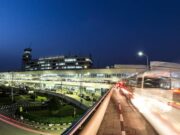IATA CEO and DG Alexandre de Juniac called on African governments to lower taxes and fees on aviation, calling the continent “an expensive place for airlines to do business.”
His remarks came during a keynote speech at the 40th Annual General Assembly meeting of the African Airline Association (AFRAA) in Rabat, Morocco.
While the global average profit per passenger is $7.80, African airlines lose $1.55 for every passenger carried, according to IATA. Aside from the burden of high fees and taxes, de Juniac cited jet fuel costs, which are 35% higher than the rest of the world, as well as user charges that are double the industry average, as obstacles preventing the region from enhancing airline competitiveness.
De Juniac said there is “no shortage of examples” illustrating the burdens governments place on aviation in Africa, including per-passenger taxes of $80 in Niger; $37 in Cameroon; and $24 in Ethiopia as examples of government overreach in the region.
“Too many African governments view aviation as a luxury rather than a necessity. We must change that perception,” de Juniac said. “The value of aviation for governments is not in the tax receipts that can be squeezed from it. It is in the economic growth and job creation that aviation supports.”
The IATA chief expressed alarm over the amount of foreign currency funds that 10 African governments have blocked airlines from repatriating, which now totals roughly $670 million, saying it is “in everybody’s interest that airlines are paid on-time, at fair exchange rates and in full.”
While de Juniac praised governments in Egypt and Nigeria for releasing the blocked funds following successful negotiations with IATA, he singled out Angola, Zimbabwe and Sudan for continuing to block the funds.
De Juniac also said African governments must improve airport infrastructure, which he admitted is “simply said, but not easily achieved.” He said the continent suffers infrastructure problems in two extremes; on the one hand, when infrastructure is built, it is often “unnecessary and unfit infrastructure with a hefty price tag,” as in Luanda, Angola; and on the other, hubs like Addis Ababa, Ethiopia; Dar es Salaam, Tanzania; and Lagos and Abuja, Nigeria, remain “critical bottlenecks” where capacity is missing.
Source:ATW


























